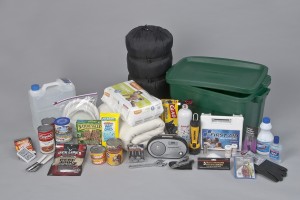 A disaster supplies kit is simply a collection of basic items your household may need in the event of an emergency.
A disaster supplies kit is simply a collection of basic items your household may need in the event of an emergency.
Try to assemble your kit well in advance of an emergency. You may have to evacuate at a moment’s notice and take essentials with you. You will probably not have time to search for the supplies you need or shop for them.
You may need to survive on your own after an emergency. This means having your own food, water and other supplies in sufficient quantity to last for at least 72 hours. Local officials and relief workers will be on the scene after a disaster but they cannot reach everyone immediately. You could get help in hours or it might take days.
Additionally, basic services such as electricity, gas, water, sewage treatment and telephones may be cut off for days or even a week, or longer. Your supplies kit should contain items to help you manage during these outages.
Download the Emergnecy Supply List
Ready Kids & The Federal Emergency Management Agency
Presents the Family Supply List
Emergency Supplies:
Water, food, and clean air are important things to have if an emergency happens. Each family or individual’s kit should be customized to meet specific needs, such as medications and infant formula. It should also be customized to include important family documents.
Recommended Supplies to Include in a Basic Kit:
- Water, one gallon of water per person per day, for drinking and sanitation
- Food, at least a three-day supply of non-perishable food
- Battery-powered radio and a NOAA Weather Radio with tone alert, and extra batteries for both
- Flashlight and extra batteries
- First Aid kit
- Whistle to signal for help
- Infant formula and diapers, if you have an infant
- Moist towelettes, garbage bags and plastic ties for personal sanitation
- Dust mask or cotton t-shirt, to help filter the air
- Plastic sheeting and duct tape to shelter-in-place
- Wrench or pliers to turn off utilities
- Can opener for food (if kit contains canned food)
Clothing and Bedding:
If you live in a cold weather climate, you must think about warmth. It is possible that the power will be out and you will not have heat. Rethink your clothing and bedding supplies to account for growing children and other family changes. One complete change of warm clothing and shoes per person, including:
- A jacket or coat
- Long pants
- A long sleeve shirt
- Sturdy shoes
- A hat and gloves
- A sleeping bag or warm blanket for each person
Below are some other items for your family to consider adding to its supply kit. Some of these items, especially those marked with a * can be dangerous, so please have an adult collect these supplies.
- Emergency reference materials such as a first aid book or a print out of the information on www.ready.gov
- Rain gear
- Mess kits, paper cups, plates and plastic utensils
- Cash or traveler’s checks, change
- Paper towels
- Fire Extinguisher
- Tent
- Compass
- Matches in a waterproof container*
- Signal flare*
- Paper, pencil
- Personal hygiene items including feminine supplies
- Disinfectant*
- Household chlorine bleach* – You can use bleach as a disinfectant (diluted nine parts water to one part bleach), or in an emergency you can also use it to treat water. Use 16 drops of regular household liquid bleach per gallon of water. Do not use scented, color safe or bleaches with added cleaners.
- Medicine dropper
- Important Family Documents such as copies of insurance policies, identification and bank account records in a waterproof, portable container